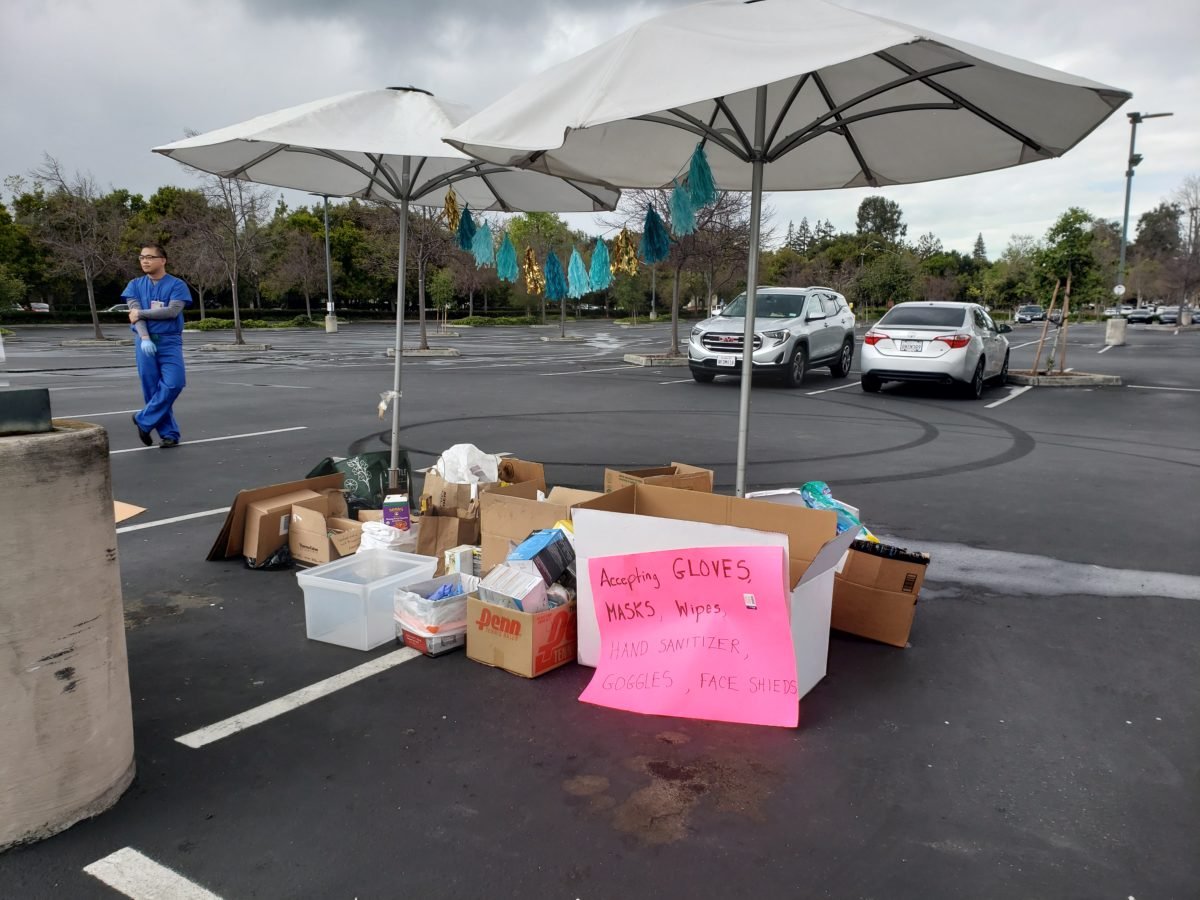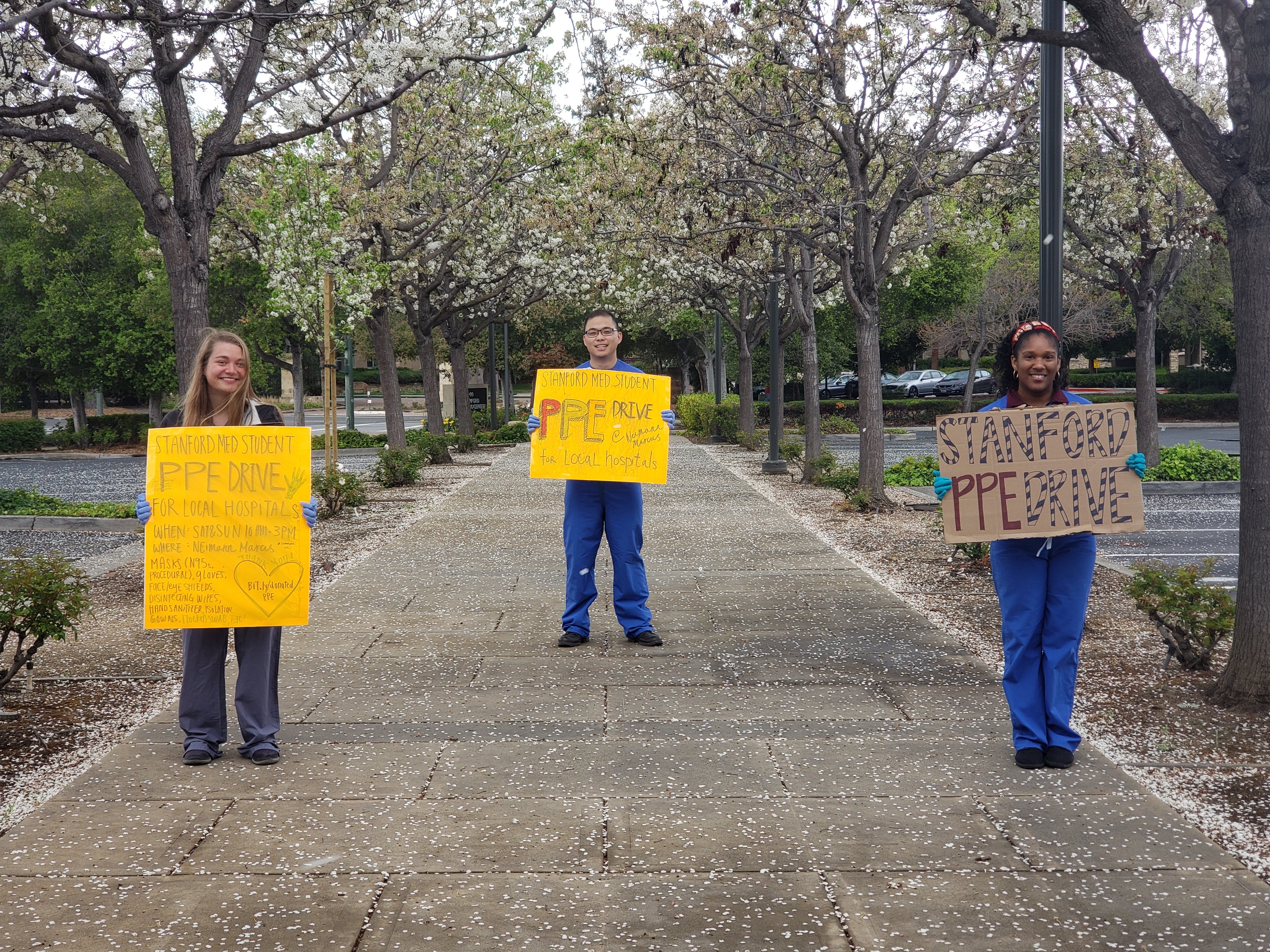A personal protective equipment (PPE) drive hosted by students from Stanford Medicine and the School of Engineering yielded more than 4,000 N95 respirators and 10,000 surgical masks for local hospitals and clinics. The drive ran from Thursday to Sunday outside of the Stanford Shopping Center.
In addition to the respirators and masks, the students collected 521 boxes of gloves, 72 containers of hand sanitizer and miscellaneous items like surgical gowns and face shields, according to Dasha Savage, a third-year M.D. student and one of the drive’s organizers. The students plan to donate the PPE to hospitals across the South Bay and host another series of drives next week.
With the number of cases in the U.S. having surpassed 140,000, the most in any country, medical workers nationwide are reporting dire shortages of PPE necessary to protect them from potential infection. In the Bay Area, nurses from Kaiser Permanente’s Oakland and Richmond locations protested measures to limit PPE to nurses working with patients confirmed to have COVID-19. Stanford Medicine began accepting PPE donations on March 22 “in an abundance of caution as COVID-19 spreads.”
The drive accepted opened, unopened and even homemade PPE. Third-year medical student Maïté Van Hentenryck, one of the drive’s organizers, said the donations ranged from “silly,” like a bottle of invisible glove — “We’ll try to make it work,” she said — to two large donations of 2,000 and 3,000 N95 respirators.
The students plan to donate the PPE to hospitals like the Palo Alto VA, Kaiser Santa Clara and Stanford Hospital, as well as smaller clinics in the area.
“We’re donating to some smaller clinics like the Ravenswood Clinic, the Mayo Clinic, Healthcare for the Homeless, all these places that are at risk of closing their doors if they don’t get PPE,” Van Hentenryck said.
Different hospitals and clinics had different standards for PPE donations, according to Van Hentenryck. Stanford Medicine only accepts donations in their “unopened, original packaging” and does not accept homemade supplies.
Van Hentenryck and Savage are joined by three other third-year medical students — Daniel Bernstein, Arifeen Rahman and Kelly Zhang — in running and organizing the drive, supplemented by a group of “about 45” volunteers.

Donors included older citizens, Palo Altans stopping by on bikes and Stanford professors. Some had planned to donate, and others stopped by after passing a sign advertising the event. Many expressed their gratitude both for the work of the student volunteers and medical workers on the front line.
“They’re absolutely amazing people,” said Maureen Griffin, who donated masks and two “Costco-sized” packages of Clorox wipes. “They’re putting their lives on the line; they’re putting their family’s life on the line.”
Computer science associate professor Clark Barrett stopped by the drive to drop off gloves and masks after hearing about it from a City of Palo Alto email.
“I wanted to do something to help and want my kids to know that we’re doing something to help,” Barrett said, commending Santa Clara County for being one of the first counties in the state to issue a shelter-in-place order. “I’m hopeful that we’re not going to see it as bad as some other places.”
Van Hentenryck said the volunteers were following county guidelines and maintaining “proper social distancing” while collecting the PPE.
“We’re trying to stay six feet apart and use gloves to collect all of the donations,” Van Hentenryck said, explaining that donors could leave the PPE on the ground for a student to pick up.
Yun Kim of Redwood City said she had been driving past the Shopping Center when she saw one of the medical students holding up a sign advertising the drive, giving her an opportunity to donate N95 respirators she had in the back of her car.
“Thank you guys for serving, everyone, and risking your life,” she said, addressing the volunteers. “I just feel so bad that we don’t have enough. We could have done a better job.”
One donor was concerned that the items she brought would not meet the students’ standards.
“Do you take these without the package?” she asked about a plastic bag of N95 respirators before moving to indicate the other masks she had brought. “Are these okay? And these?”
Jason Khoo ’16, a second-year medical student and drive volunteer, assured her that her donation was welcome.
“We take anything,” Khoo said, smiling. “Perfect, thank you.”
